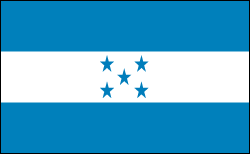HONDURAS

- Free education is only provided for children through 6th grade. Many children do not continue on with education even though there are some financial supports that pay partial tuition for continuing students. It is common for boys to go and work in the farm fields and it is not uncommon for girls to marry as early as 12-14 years of age.
- Spanish is the national language although some schools are bilingual. 93% of the population are considered mestizo (a mix of native and European descent) however, there are still some native ethnic groups (Lencas, Chortís, Tolupanes, Pech, Tawahkas, and Miskitos) as well as a group of people who descend from African slaves from the Caribbean islands called the Garífunas, as well as many people of Afro-Caribbean ascent.
- Catholicism is the major religion in Honduras with Christian holidays being a major event for many people. Christmas for instance, in Honduras, begins at midnight on the 24th and are celebrated for weeks before and after with fireworks. At New Years the Honduras people make a doll called Año Viejo to symbolize all the bad things that happened during the year and then they burn the doll to burn away the bad memories. At Easter there are elaborate parades and people decorate the streets with "carpets" of a thin layer of pre-painted saw dust. Children celebrate their birthdays with candy/prize filled piñatas.
 |
| Año Viejo |
 |
| Easter Parades |
 |
| Easter "Carpets" |
 |
| Piñatas |
The easiest way to make a family feel valued and appreciated is to celebrate their traditions. For a Christmas it would be fun to include families in helping to make a traditional Honduras Christmas feast which includes: tamales, torrejas, sweet potato puree, eggnog, roasted pork ham, roasted turkey, stuffing, and cranberry sauce. If it is not possible to include religious celebrations at your center then it is good to know about these traditions so that you can inquire about and have a conversation with children and their families about their celebrations. It shows that you value their beliefs and culture.
- I believe that it is very important to show respect and acknowledgement for famous people of Honduras. This shows children that we value role models from their country as well as our own.
- Finally, I learned that respect is a key concept in Honduras. It is rude to begin any conversation without making a proper greeting and asking about a families' night or weekend. Children are required to show respect for their elders and stop and listen when spoken to. Honduras society also show respect for special needs. For example the bank has a special line for retired people, people with disabilities, and pregnant women.
I would hope that by preparing for a family from a different culture they would make an easy transition into the dominant culture while maintaining their own culture. My primary goal would be to show that I value their culture and traditions and encourage them to share their unique experiences with the classroom environment. It is always best when children can feel a continuity between home and school. Children should never be made to feel like they have to choose one culture over another.
References
Farah, D. (2014, August 8). Five myths about the border crisis. In The Washington Post. Retrieved August 15, 2014, from http://www.washingtonpost.com/opinions/five-myths-about-the-border-crisis/2014/08/08/1ec90bea-1ce3-11e4-ab7b-696c295ddfd1_story.html
Honduran people and culture (2014). In This is Honduras. Retrieved August 15, 2014, from http://thisishonduras.com/People_and_Culture.htm
Honduras (n.d.). In Fact Monster. Retrieved August 15, 2014, from http://www.factmonster.com/country/honduras.html
Living in Honduras (n.d.). In International Living. Retrieved August 15, 2014, from http://internationalliving.com/countries/honduras/live-in-honduras/
Problems with education in Honduras (n.d.). In Honduras Good Works. Retrieved August 15, 2014, from http://hondurasgoodworks.org/education/problems-with-education-in-honduras/
No comments:
Post a Comment